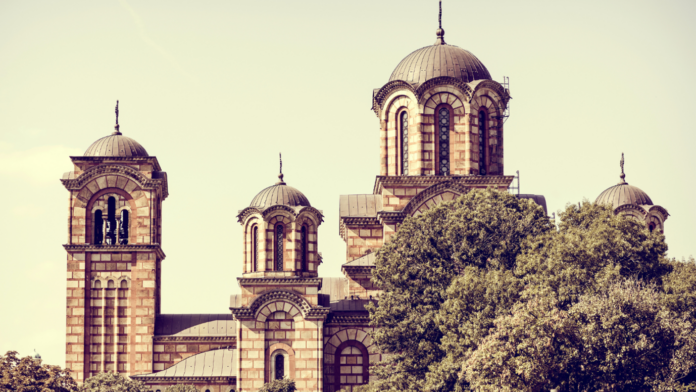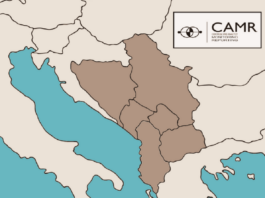The history of Europe has been shaped for many centuries by churches, whether Christian – Catholic, Protestant, Orthodox, or Islamic religion. The national identities of many nations in Europe are at least partly based on or influenced by religious heritage. The Western Balkans region was and still is no different. Looking at the region today, the Serbian Orthodox Church (SPC), partner of the Russian Orthodox Church (RPC), still plays a vital role. Furthermore, its political and influential role is increasing. This increase endangers a stable future of the Balkan states. The danger of this trend can already be observed in every Balkan state where the Serbian minority and the SPC are present.
Montenegro as a warning finger
As a recent publication by the Bosnian Atlantic Initiative (Atlantska Inicijativa) shows, the relationship between the SPC and the Montenegrin government has always been controversial and conflictual. The SPC is the main religious institution in the country, with about 90% of the local Orthodox believers. The rest of the orthodox believers are under the canonically unrecognized Montenegrin Orthodox Church (MPC). The SPC in Montenegro opposed the idea of an independent Montenegrin state, criticized the recognition of Kosovo, and promoted and disseminated anti-NATO and anti-Western narratives in general.
The SPC’s activities and positions culminated in 2019 and 2020 when their actions supported the change of government. In December 2019, the Montenegrin parliament passed a “Law on religious freedoms”, which was strongly opposed by the SPC, pro-Serb political movements and Serbia itself. This law dealt with the ownership of the religious communities’ property rights. The law stipulated that ownership of these properties, objects and sites belonged to the state unless the Church was able to prove ownership before 1918 when Montenegro joined the Kingdom of Serbs, Croats and Slovenes. The opposition claimed that the law was aimed at promoting the MPC.
The SPC organized numerous protests, which they have labelled as a „litije“ – a festive religious procession accompanied by speeches and religious symbolism. The series of protests were held also in Serbia and Republika Srpska. These events were politically oriented and changed the political situation in Montenegro in favour of the pro-Serb opposition. The SPC managed to gather the largest number of protesters since the independence of Montenegro in 2006. In August 2020, the opposition won the elections, because the leading party was not able to create a government.
The new government altered the initial law in 2019. The section dedicated to the registration of religious buildings and objects before 1918 was changed. The final agreement between Podgorica and SPC was signed in August 2022. This move was not met with the understanding of the opponents of the SPC and Serbian influence in Montenegro. Opponents organized smaller demonstrations and protests. Developments since 2019 and opinion polls show that the SPC is one of the most influential players in Montenegro, although it is often accused of being a Serbian instrument of influence and a threat to Montenegrin identity.
The SPC in Republika Srpska follows the secessionist steps of Banja Luka
The SPC in Bosnia became very active in 2023 in terms of policy actions and narratives, and this activity continued in early 2024. The Church enjoys the support of the government of the Bosnian entity Republika Srpska and Serbia itself. Following the government’s current secessionist tendencies, the SPC also distances itself from religious cooperation in Bosnia.
The good relationship between the SPC and Banja Luka can be seen in their relationship with Milorad Dodik, Serbian member of the Bosnian Tripartite Presidency and President of Republika Srpska. He often praises and defends the SPC and participates in various events or meetings – cultural, religious or political – where SPC members are present. He has also defended the SPC in the wake of recent accusations by British politicians that the church was smuggling weapons into Kosovo. However, this is not the first time SPC has been accused of mischief. Dodik stood by the SPC already in 2021, when Croat and Bosnian representatives in Bosnia’s tripartite presidency labelled the SPC in general as a source of instability in the region. It was connected to the events in Montenegro.
The SPC devoted part of its agenda during their summer’s council in Belgrade to the situation in Bosnia. Their official communiqué mentioned it as „the issue of divisive inter-religious relations in Bosnian society, the increasingly frequent manifestations of religious and national hatred on the part of religious leaders and individual representatives of public and political life, and, in this context, to the work of the Inter-Religious Council in Bosnia and Herzegovina„. The same pretext was used in February 2023, when the SPC suspended its membership in the Interreligious Council of BiH. The fact that in June 2023 the SPC did not participate in the 98th session of the Assembly is an indication of the secessionist tendencies.
Serbia at least publicly tries not to interfere too much in Bosnia’s internal problems and SPC-related issues. That said, in July 2023, Serbian president Aleksandar Vucic met with Milorad Dodik and with the head of SPC Patriarch Porfirije. This meeting was dedicated to the events of the Yugoslavian war – Croatian armed operation „Storm“, which led to the death and expulsion of many ethnic Serbs from the region. They have agreed to mark 4th August as a day of remembrance.
Some analysts believe that Belgrade used SPC in both Montenegro and Bosnia to fuel the protests related to the already-mentioned events in Montenegro. Per their claim, the ‚litije‘ was politicized in both countries and it was accompanied by hate speech and references to the bloody conflict Nevertheless, the Montenegrin scenario was not repeated in Bosnia.
The continuation of Dodik’s close relationship with the SPC is evidenced by their joint activities in early 2024. In February, Dodik opened an exhibition dedicated to St. Sava in Banja Luka with the participation of church leaders. Milorad Dodik can be seen in general in the presence of church members in many photos published from various events on his public profiles. This is also related to the higher level of government activity towards the renovation of church buildings across the country. One of the biggest joint events was the celebration of Republika Srpska Day on 9th January. In Banja Luka, there was an event and also a parade, the participants of which were school pupils, members of the fire or rescue brigade, as well as security forces and even the Russian motorcycle club Night Wolves. The SPC was also significantly represented at these events. One of the guests was SPC Patriarch Kyr Porfirie himself.
Relations between Belgrade and SPC manifested in Bosnia and Montenegro
The interconnection between the SPC and Belgrade has already been outlined to a significant extent in the previous two cases. These two institutions, the SPC and the Serbian government, share similar goals and narratives. The issue of Kosovo is a good example. Serbia does not officially recognise Kosovo and is not going to change this position. According to SPC Patriarch kyr Porfirije, Kosovo is as important to their church as the Vatican is to Catholics. In the past, some of the actions of the current Serbian president regarding Kosovo have led to a conflict between him and the institution, but subsequently, the situation has changed and Vučić has more or less gained the trust of the Church leaders.
Events in 2023 and 2024, some of them mentioned in a part dedicated to Milorad Dodik, indicate a good degree of relations and cooperation between the leaders of the country and the leaders of the Church in Serbia.
Author: Richard Straka




